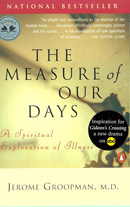Books |
The Measure of Our Days
Jerome Groopman
By
Published: Jan 01, 2005
Category:
Non Fiction
The Measure of Our Days
Jerome Groopman
Jerome Groopman was a student at medical school when his father, “the person I loved and admired most in the world,” was stricken by a heart attack. Groopman rushed to the hospital. There he met the doctor who was treating his father — “a general practitioner unknown to my family, who offered no special medical expertise or emotional comfort. My father died before my eyes. He died before his time, and without time — time for him, his family, and his friends to prepare for his passing.”
Jerry Groopman is now a Professor at Harvard Medical School, a leading researcher in cancer and AIDS, an astonishingly good writer for someone who does not have writing as a primary career, and, most to the point, just the doctor you’d want if your life literally depended on it. In this book, he tells the stories of eight of his patients in a style that artfully blends case histories that are often about loss with personal histories that are often about gain.
These stories share a common frame of reference: the importance of time. Groopman cannot save his patients — this book was first published in 1997 and describes people Groopman treated earlier in the decade, when AIDS was, almost without exception, a death sentence — but he can buy them time. And if they are smart and brave and resourceful, they can use that time to close out the story of their lives with something like wholeness and integrity. Groopman can, in short, give his patients what was denied to his father. He can make death “right.”
And, in the process, Groopman can prepare himself for his own death: “I hoped my intimate relationship with death, beginning with the death of my father, through the deaths of so many of the patients I cared for, would somehow lessen the fear, allow me to face the unknown with the sense that others I had known had passed before me, and all I knew would go after. The unknown would then be understood not as a terror but as a comfort, because it held within it the possibility that I would be reunited with those I loved who were gone, in some form and in some dimension, and that I might be linked, like my father, through memory with those I would leave behind.”
But you do not need the looming presence of Groopman’s personal quest to be glued to these pages — the patients are fascinating in themselves. Here’s Kirk, the 54 year-old venture capitalist who regards cancer as he would a market challenge. He bets on aggressive treatment as he once bet on his investments. “I’ll surprise you,” he tells Groopman. “There’ll be a tenfold return on your investment.” But there isn’t. And Kirk, who has missed most of his children’s lives, turns bitter. “I have no equity. No dividends coming in. Nothing to show in my portfolio….I was a self-absorbed uncaring shit.”
Contrast Kirk with Dan Berger, a researcher in Groopman’s lab. In a too-ironic-to-be-true twist of fate, he’s a hemophiliac — and he’s contracted AIDS. But Dan does not see his Fate as a curse. His parents had been in Auschwitz . They taught him that there is no such thing as “normal” life. Dan confronted fear and panic. He made his life normal. As he lived with dignity, so he died with dignity.
In these pages, you’ll meet Cindy, who had sex with the wrong guy and got AIDS — and chose to adopt a baby. And Debbie, from a distinguished New England family, whose response to cancer is to find a New Age “healer.” Groopman is withering on this subject: “Alternative healers readily place responsibility for the failure of conventional treatments on the doctor’s shoulders and then place responsibility for the failure of their healing on the patient’s.”
Somewhere in these pages, you’ll find a case that has some personal hook for you. For me, it’s the story of Elliott, a writer who happens to be an old friend of Groopman’s. Elliott has to face reduced expectations — both in his career and now from his disease. But he learns something powerful from his survival: “I learned in yeshiva years ago the question posed by the Talmud: Eizehoo ashir? — Who is wealthy? And the rabbi’s response: Ha sameach b’chelko — He who rejoices in his portion.”
As we await what Groopman calls “life’s last visitor,” this is a book that can actually help us — not just to prepare ourselves for that inevitable knock at the door, but to rejoice in our portion and to gain what the Psalmist calls “a heart of wisdom.”
To buy “The Measure of Our Days” from Amazon.com, click here.


